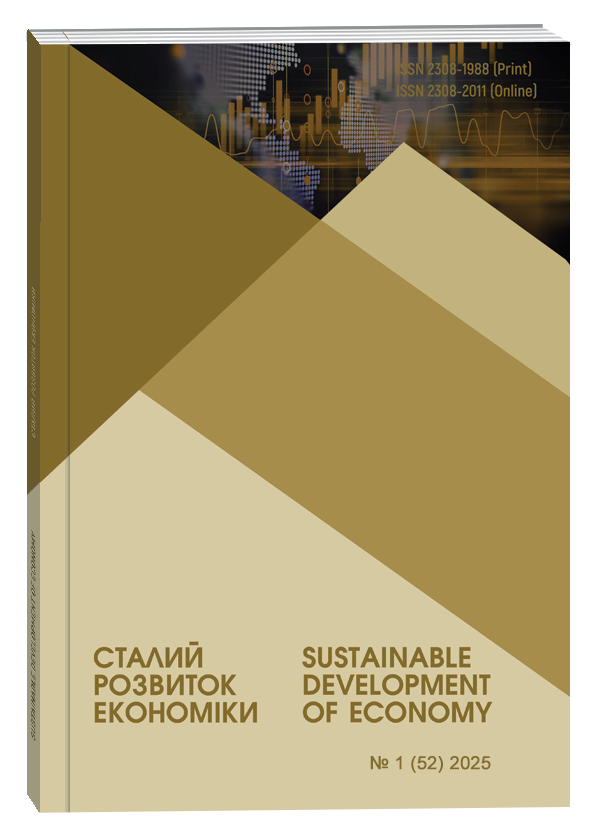IMPLEMENTATION OF THE 4-DAY WORKWEEK AS AN INNOVATIVE APPROACH TO ENTERPRISE HUMAN CAPITAL MANAGEMENT
Abstract
The article examines the introduction of a 4-day working week as an innovative approach to managing the human capital of an enterprise. The topic's relevance is stipulated by the need to find new models of labor organization that would meet modern market challenges and ensure competitive advantages of an enterprise through the efficient use of human capital. The purpose of the study is to provide a comprehensive analysis of the peculiarities of introducing a shorter working week and its impact on labor productivity, employee satisfaction, and overall efficiency of business processes. The methodological basis of the study is a systematic approach to the study of organizational changes and their impact on the enterprise. The study uses methods of comparative analysis to assess the results of implementing a 4-day working week in different organizations, statistical analysis to process data on labor productivity and other performance indicators, and methods of qualitative analysis to study the organizational aspects of implementing a new working time model. The study is based on the practical experience of enterprises in various industries and scales of activity. The study found that the introduction of a 4-day working week has a positive impact on the key performance indicators of an enterprise. A significant increase in labor productivity, a decrease in the level of professional burnout of employees, and an improvement in the work-life balance have been identified. It is determined that the success of the implementation of a shortened working week depends on the quality of the preparatory stage and the ability of the organization to adapt its business processes. At the same time, the study identifies a number of challenges faced by enterprises in the transition to a new model of labor organization, including the issue of ensuring continuity of customer service and additional requirements for optimizing work processes. The practical value of the study lies in the development of recommendations for the effective implementation of a 4-day working week, taking into account the specifics of the enterprise. A methodological approach to assessing the readiness of an organization to switch to a shorter working week is proposed and the key success factors for such a transformation are identified. The results of the study can be used by business managers and HR professionals to plan and implement projects to introduce flexible forms of labor organization.
References
10 months on: Has our four-day week been a success? Atom Bank Blog. 2022. URL: https://www.atombank.co.uk/blog/four-day-week-10-months-on/ (дата звернення: 08.02.2025).
4 Day Week Trial Results. 4 Day Week Global. 2024. URL: https://www.4dayweek.com/research (дата звернення: 08.02.2025).
4-Day Workweek Boosted Workers' Productivity By 40%, Microsoft Japan Says. NPR. 2019. URL: https://www.npr.org/2019/11/04/776163853/microsoft-japan-says-4-day-workweek-boosted-workers-productivity-by-40?t=1655284726261 (дата звернення: 08.02.2025).
Barnes A. The 4 Day Week: How the Flexible Work Revolution Can Increase Productivity, Profitability and Well-being, and Create a Sustainable Future. London: Piatkus, 2020. 240 p.
Bersin J. How to Actually Execute a 4-Day Workweek. Harvard Business Review. 2023. URL: https://hbr.org/2023/12/how-to-actually-execute-a-4-day-workweek (дата звернення: 08.02.2025).
Big Idea for the New Decade: 4 Day Week phenomenon told in new book. PR Newswire. 2019. URL: https://www.prnewswire.com/news-releases/big-idea-for-the-new-decade-4-day-week-phenomenon-told-in-new-book-300934244.html (дата звернення: 08.02.2025).
Campbell T.T. The four-day work week: a chronological, systematic review of the academic literature. Management Review Quarterly. 2023. Vol. 74. P. 1791–1807. DOI: https://doi.org/10.1007/s11301-023-00347-3
Could A Four-Day Work Week Boost Productivity? Work.Life. 2024. URL: https://work.life/blog/four-day-work-week/ (дата звернення: 08.02.2025).
Dutordoir M., Struyfs K. Does a compressed workweek benefit shareholders? An event study analysis of Belgium’s adoption of the Four-Day Workweek. SSRN Electronic Journal. 2023. DOI: https://doi.org/10.2139/ssrn.4338672
Four Day Week. Henley Business School. 2019. URL: https://www.henley.ac.uk/fourdayweek (дата звернення: 08.02.2025).
Hong W., Yao C., Zhou L. A Case Study of Reform of the Four Day Work Week System in the UK. Journal of Education, Humanities and Social Sciences. 2024. Vol. 27. P. 53–58. DOI: https://doi.org/10.54097/a91z0848
Laker B., Roulet T. Will the 4-Day Workweek Take Hold in Europe? Harvard Business Review. 2019. URL: https://hbr.org/2019/08/will-the-4-day-workweek-take-hold-in-europe (дата звернення: 08.02.2025).
Office Worker Productivity. Vouchercloud. 2018. URL: https://www.vouchercloud.com/better-living/office-worker-productivity (дата звернення: 08.02.2025).
The numbers behind four-day work weeks and paid mental health days. Qualtrics Blog. 2022. URL: https://www.qualtrics.com/blog/four-day-work-week/ (дата звернення: 08.02.2025).
Veal A. The 4-day work-week: the new leisure society? Leisure Studies. 2022. Vol. 42. № 2. P. 172–187. DOI: https://doi.org/10.1080/02614367.2022.2094997


